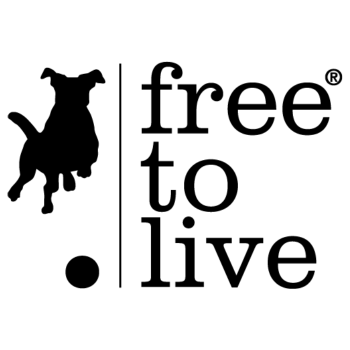Just like humans, dogs can experience anxiety and stress. Many things can trigger anxiety in dogs, including thunderstorms, fireworks, car rides, and separation from their owners.
Bonfire night and all those fireworks flying around can be a very stressful time for dogs. Try to spend some time beforehand desensitising your dog to the sound of fireworks, for example you could play recordings of fireworks at a low volume and gradually increase the volume over time. On bonfire night or when fireworks are being set off, keep the TV on or play soothing music to distract your dog.
Use calming aids. There are a number of calming aids and supplements available for dogs which can help to reduce anxiety and make your dog feel more relaxed. Free To Live has launched a new Coat Mist that contains a blend of natural and calming essential oils. This can be used directly onto your dog’s fur or onto bedding or a blanket to help create a calm environment for your dog.
Stay with your dog. If possible, stay with your dog on bonfire night. This will help them to feel safe and secure. If you can't be home, ask a friend or family member to stay with your dog instead.
Be patient and understanding. It's important to be patient and understanding with your anxious dog on bonfire night. They may be scared and confused, so try to stay calm and reassuring.
More tips to reduce anxiety in dogs
If your dog is anxious, there are a number of things you can do to help them calm down.
- Provide a safe and secure environment.
Dogs need a place where they can feel safe and secure. This should be a quiet, dark place where your dog feels comfortable and secure. It could be a crate, their bed, or even just a corner of the room with some blankets draped over it. Put some of your dog's favourite toys and treats in their safe space, so they have something to keep them occupied. When your dog is feeling anxious, encourage your dog to go to their safe place to calm down.
- Exercise your dog regularly.
Exercise is a great way to reduce stress and anxiety in dogs. Aim to give your dog at least 30 minutes of exercise each day.
- Train your dog.
Training helps to build trust and communication between you and your dog. It also gives your dog something to focus on, which can help to reduce anxiety. Contact a dog trainer if you need extra support with this.
- Avoid triggers.
If you know what triggers your dog's anxiety, try to avoid those things as much as possible. For example, if your dog is afraid of thunderstorms, close the curtains and turn on the TV or radio to drown out the noise. If your dog is anxious about car rides, try starting with short rides and then gradually increase the distance.
- Seek professional help.
- Be calm yourself.
Dogs can sense our emotions, so it is important to be calm and reassuring. When they are feeling anxious, talk to them in a soft, soothing voice and pet them gently.
- Give them a distraction.
If your dog is focused on something else, they are less likely to be anxious. Try giving them a toy to play with or a chew treat to keep them occupied.
- Create a routine.
Dogs thrive on routine. Having a regular schedule for meals, walks, and playtime can help to reduce anxiety and stress.
If you have a dog that is prone to anxiety, it is important to be patient and understanding. It may take some time and effort on your part to find out what works best for your dog. Not all dogs will respond to the same calming methods. Some dogs may need a combination of different approaches. However, with the right tools and support, you can help your dog to live a happier and more relaxed life.

